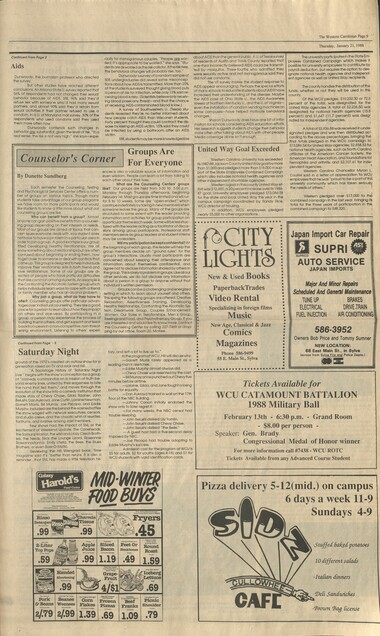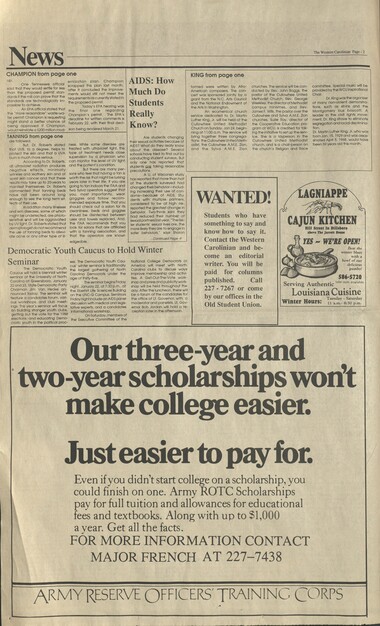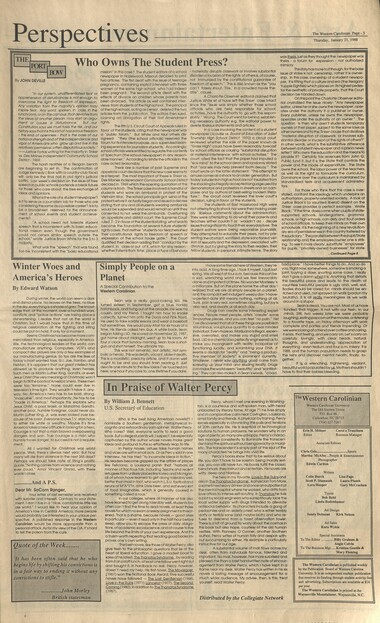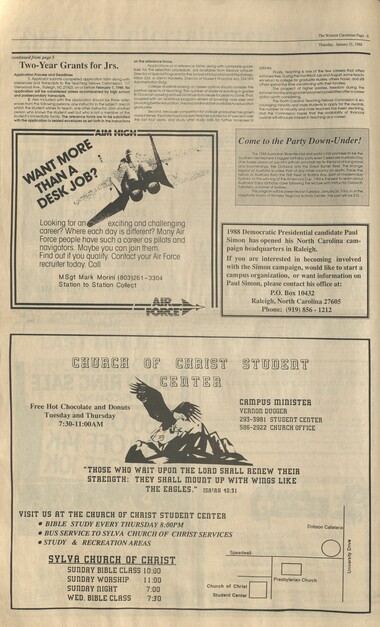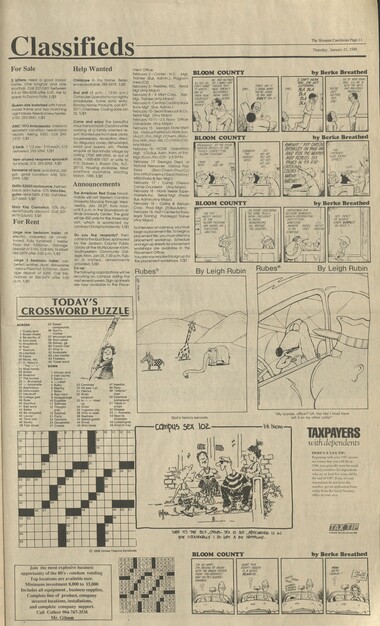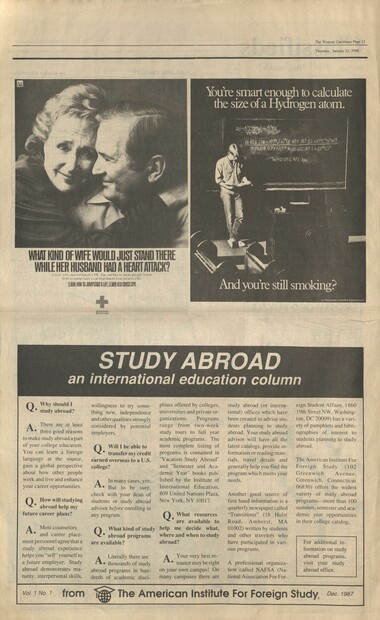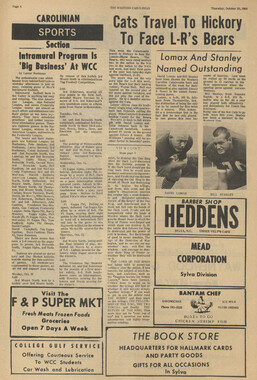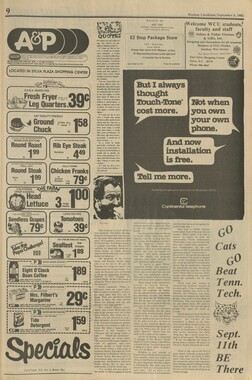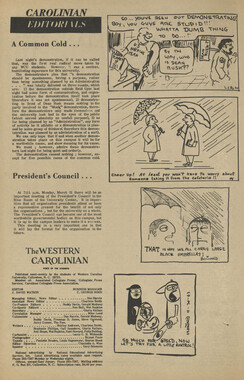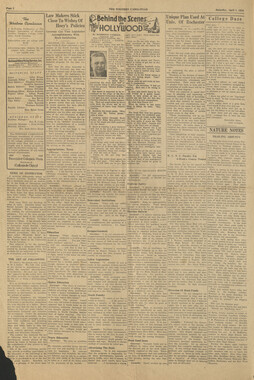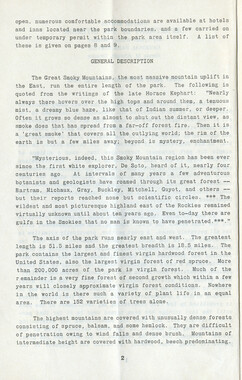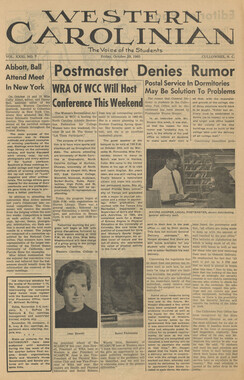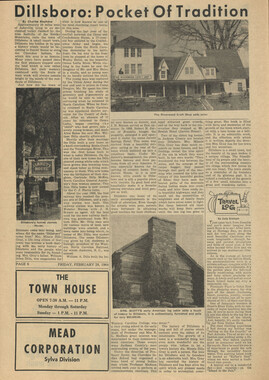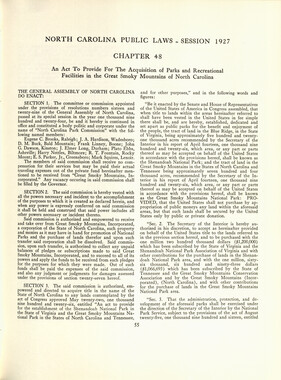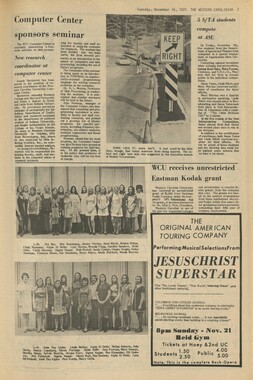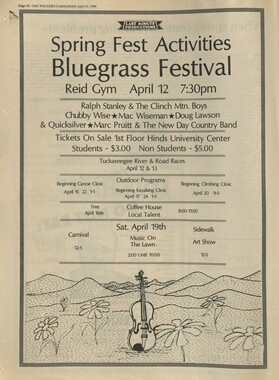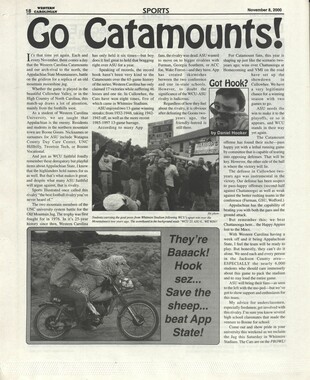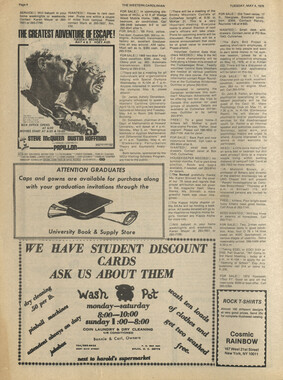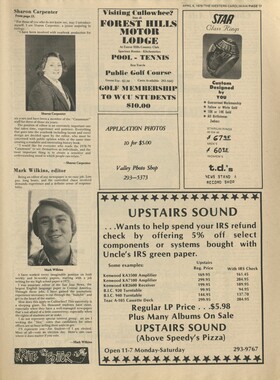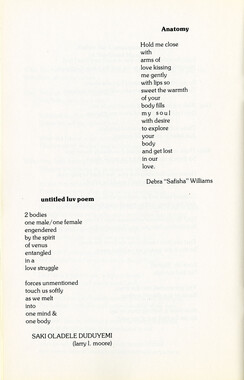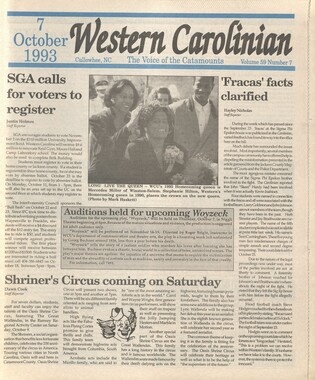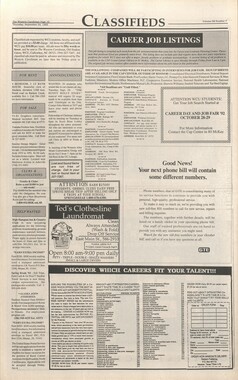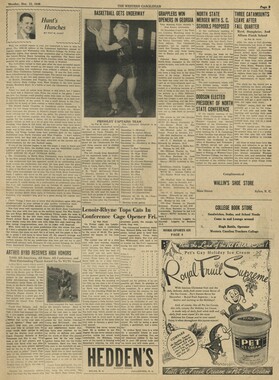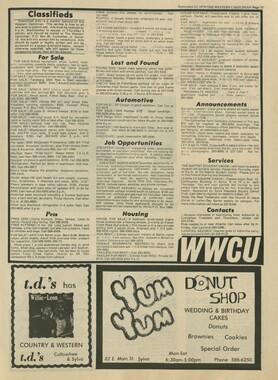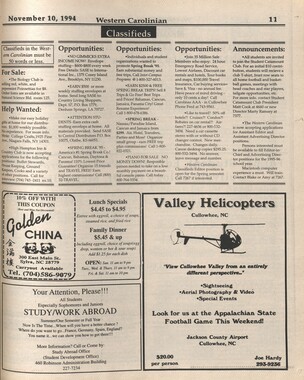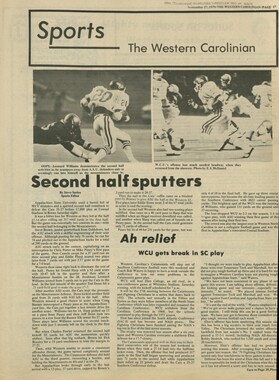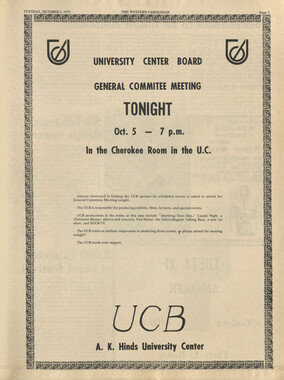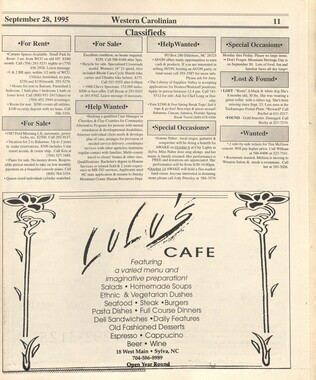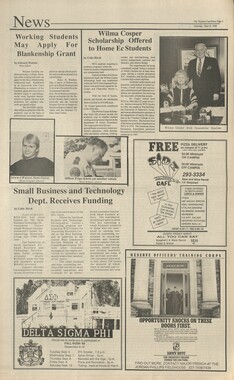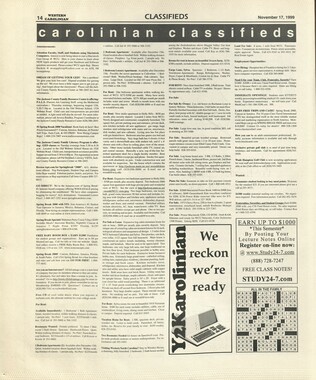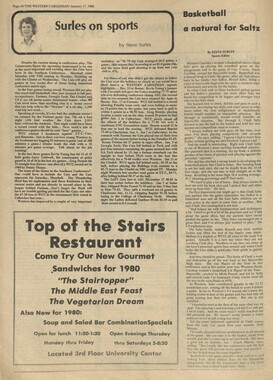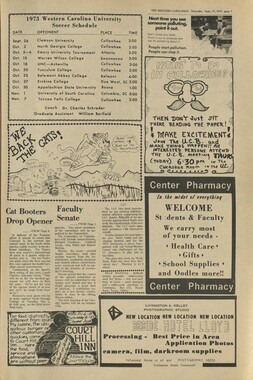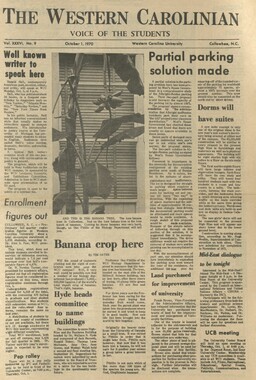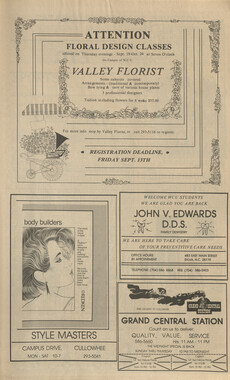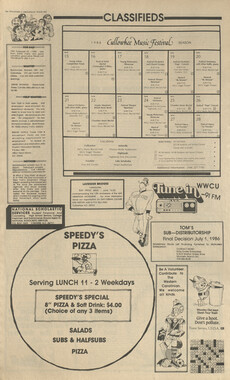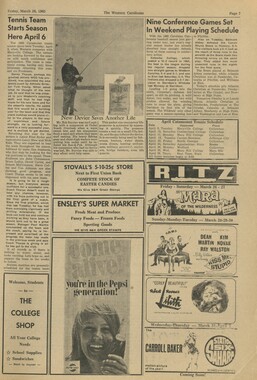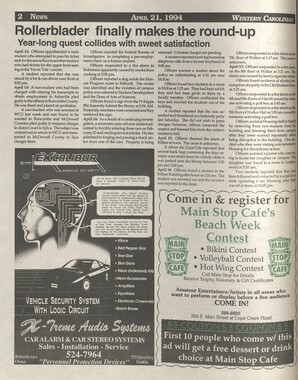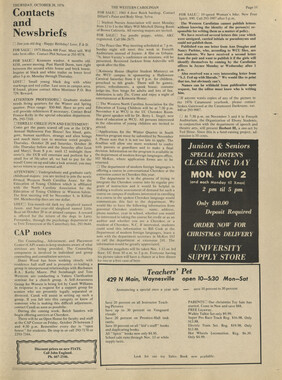Western Carolina University (20)
View all
- Canton Champion Fibre Company (2308)
- Cherokee Traditions (293)
- Civil War in Southern Appalachia (165)
- Craft Revival (1942)
- Great Smoky Mountains - A Park for America (2767)
- Highlights from Western Carolina University (430)
- Horace Kephart (941)
- Journeys Through Jackson (154)
- LGBTQIA+ Archive of Jackson County (24)
- Oral Histories of Western North Carolina (314)
- Picturing Appalachia (6772)
- Stories of Mountain Folk (413)
- Travel Western North Carolina (160)
- Western Carolina University Fine Art Museum Vitreograph Collection (129)
- Western Carolina University Herbarium (92)
- Western Carolina University: Making Memories (708)
- Western Carolina University Publications (2283)
- Western Carolina University Restricted Electronic Theses and Dissertations (146)
- Western North Carolina Regional Maps (71)
- World War II in Southern Appalachia (131)
University of North Carolina Asheville (6)
View all
- Allanstand Cottage Industries (62)
- Appalachian National Park Association (53)
- Bennett, Kelly, 1890-1974 (1388)
- Berry, Walter (76)
- Brasstown Carvers (40)
- Carver, George Washington, 1864?-1943 (26)
- Cathey, Joseph, 1803-1874 (1)
- Champion Fibre Company (233)
- Champion Paper and Fibre Company (297)
- Cherokee Indian Fair Association (16)
- Cherokee Language Program (22)
- Crowe, Amanda (40)
- Edmonston, Thomas Benton, 1842-1907 (7)
- Ensley, A. L. (Abraham Lincoln), 1865-1948 (275)
- Fromer, Irving Rhodes, 1913-1994 (70)
- George Butz (BFS 1907) (46)
- Goodrich, Frances Louisa (120)
- Grant, George Alexander, 1891-1964 (96)
- Heard, Marian Gladys (60)
- Kephart, Calvin, 1883-1969 (15)
- Kephart, Horace, 1862-1931 (313)
- Kephart, Laura, 1862-1954 (39)
- Laney, Gideon Thomas, 1889-1976 (439)
- Masa, George, 1881-1933 (61)
- McElhinney, William Julian, 1896-1953 (44)
- Niggli, Josephina, 1910-1983 (10)
- North Carolina Park Commission (105)
- Osborne, Kezia Stradley (9)
- Owens, Samuel Robert, 1918-1995 (11)
- Penland Weavers and Potters (36)
- Roberts, Vivienne (15)
- Roth, Albert, 1890-1974 (142)
- Schenck, Carl Alwin, 1868-1955 (1)
- Sherrill's Photography Studio (2565)
- Southern Highland Handicraft Guild (127)
- Southern Highlanders, Inc. (71)
- Stalcup, Jesse Bryson (46)
- Stearns, I. K. (213)
- Thompson, James Edward, 1880-1976 (226)
- United States. Indian Arts and Crafts Board (130)
- USFS (683)
- Vance, Zebulon Baird, 1830-1894 (1)
- Weaver, Zebulon, 1872-1948 (58)
- Western Carolina College (230)
- Western Carolina Teachers College (282)
- Western Carolina University (1794)
- Western Carolina University. Mountain Heritage Center (18)
- Whitman, Walt, 1819-1892 (10)
- Wilburn, Hiram Coleman, 1880-1967 (73)
- Williams, Isadora (3)
- Cain, Doreyl Ammons (0)
- Crittenden, Lorraine (0)
- Rhodes, Judy (0)
- Smith, Edward Clark (0)
- Appalachian Region, Southern (2393)
- Asheville (N.C.) (1887)
- Avery County (N.C.) (26)
- Blount County (Tenn.) (161)
- Buncombe County (N.C.) (1664)
- Cherokee County (N.C.) (283)
- Clay County (N.C.) (555)
- Graham County (N.C.) (233)
- Great Smoky Mountains National Park (N.C. and Tenn.) (481)
- Haywood County (N.C.) (3522)
- Henderson County (N.C.) (70)
- Jackson County (N.C.) (4692)
- Knox County (Tenn.) (25)
- Knoxville (Tenn.) (12)
- Lake Santeetlah (N.C.) (10)
- Macon County (N.C.) (420)
- Madison County (N.C.) (211)
- McDowell County (N.C.) (39)
- Mitchell County (N.C.) (132)
- Polk County (N.C.) (35)
- Qualla Boundary (981)
- Rutherford County (N.C.) (76)
- Swain County (N.C.) (2113)
- Transylvania County (N.C.) (247)
- Watauga County (N.C.) (12)
- Waynesville (N.C.) (68)
- Yancey County (N.C.) (72)
- Aerial Photographs (3)
- Aerial Views (60)
- Albums (books) (4)
- Articles (1)
- Artifacts (object Genre) (228)
- Biography (general Genre) (2)
- Cards (information Artifacts) (38)
- Clippings (information Artifacts) (191)
- Crafts (art Genres) (622)
- Depictions (visual Works) (21)
- Design Drawings (1)
- Drawings (visual Works) (184)
- Envelopes (73)
- Facsimiles (reproductions) (1)
- Fiction (general Genre) (4)
- Financial Records (12)
- Fliers (printed Matter) (67)
- Glass Plate Negatives (381)
- Guidebooks (2)
- Internegatives (10)
- Interviews (811)
- Land Surveys (102)
- Letters (correspondence) (1013)
- Manuscripts (documents) (619)
- Maps (documents) (159)
- Memorandums (25)
- Minutes (administrative Records) (59)
- Negatives (photographs) (5835)
- Newsletters (1285)
- Newspapers (2)
- Occupation Currency (1)
- Paintings (visual Works) (1)
- Pen And Ink Drawings (1)
- Periodicals (193)
- Personal Narratives (7)
- Photographs (12975)
- Plans (maps) (1)
- Poetry (6)
- Portraits (1663)
- Postcards (329)
- Programs (documents) (151)
- Publications (documents) (2237)
- Questionnaires (65)
- Scrapbooks (282)
- Sheet Music (1)
- Slides (photographs) (402)
- Sound Recordings (796)
- Specimens (92)
- Speeches (documents) (15)
- Tintypes (photographs) (8)
- Transcripts (322)
- Video Recordings (physical Artifacts) (23)
- Vitreographs (129)
- Text Messages (0)
- A.L. Ensley Collection (275)
- Appalachian Industrial School Records (7)
- Appalachian National Park Association Records (336)
- Axley-Meroney Collection (2)
- Bayard Wootten Photograph Collection (20)
- Bethel Rural Community Organization Collection (7)
- Blumer Collection (5)
- C.W. Slagle Collection (20)
- Canton Area Historical Museum (2110)
- Carlos C. Campbell Collection (282)
- Cataloochee History Project (65)
- Cherokee Studies Collection (4)
- Daisy Dame Photograph Album (5)
- Daniel Boone VI Collection (1)
- Doris Ulmann Photograph Collection (112)
- Elizabeth H. Lasley Collection (1)
- Elizabeth Woolworth Szold Fleharty Collection (4)
- Frank Fry Collection (95)
- George Masa Collection (173)
- Gideon Laney Collection (452)
- Hazel Scarborough Collection (2)
- Hiram C. Wilburn Papers (28)
- Historic Photographs Collection (236)
- Horace Kephart Collection (861)
- Humbard Collection (33)
- Hunter and Weaver Families Collection (1)
- I. D. Blumenthal Collection (4)
- Isadora Williams Collection (4)
- Jesse Bryson Stalcup Collection (47)
- Jim Thompson Collection (224)
- John B. Battle Collection (7)
- John C. Campbell Folk School Records (80)
- John Parris Collection (6)
- Judaculla Rock project (2)
- Kelly Bennett Collection (1407)
- Love Family Papers (11)
- Major Wiley Parris Civil War Letters (3)
- Map Collection (12)
- McFee-Misemer Civil War Letters (34)
- Mountain Heritage Center Collection (4)
- Norburn - Robertson - Thomson Families Collection (44)
- Pauline Hood Collection (7)
- Pre-Guild Collection (2)
- Qualla Arts and Crafts Mutual Collection (12)
- R.A. Romanes Collection (681)
- Rosser H. Taylor Collection (1)
- Samuel Robert Owens Collection (94)
- Sara Madison Collection (144)
- Sherrill Studio Photo Collection (2558)
- Smoky Mountains Hiking Club Collection (616)
- Stories of Mountain Folk - Radio Programs (374)
- The Reporter, Western Carolina University (510)
- Venoy and Elizabeth Reed Collection (16)
- WCU Gender and Sexuality Oral History Project (32)
- WCU Mountain Heritage Center Oral Histories (25)
- WCU Oral History Collection - Mountain People, Mountain Lives (71)
- WCU Students Newspapers Collection (1744)
- Western North Carolina Tomorrow Black Oral History Project (69)
- William Williams Stringfield Collection (2)
- Zebulon Weaver Collection (109)
- African Americans (390)
- Appalachian Trail (35)
- Artisans (521)
- Cherokee art (84)
- Cherokee artists -- North Carolina (10)
- Cherokee language (21)
- Cherokee pottery (101)
- Cherokee women (208)
- Church buildings (167)
- Civilian Conservation Corps (U.S.) (110)
- College student newspapers and periodicals (1830)
- Dams (103)
- Dance (1023)
- Education (222)
- Floods (61)
- Folk music (1015)
- Forced removal, 1813-1903 (2)
- Forest conservation (220)
- Forests and forestry (917)
- Gender nonconformity (4)
- Great Smoky Mountains National Park (N.C. and Tenn.) (159)
- Hunting (38)
- Landscape photography (10)
- Logging (103)
- Maps (84)
- Mines and mineral resources (8)
- North Carolina -- Maps (18)
- Paper industry (38)
- Postcards (255)
- Pottery (135)
- Railroad trains (71)
- Rural electrification -- North Carolina, Western (3)
- School integration -- Southern States (2)
- Segregation -- North Carolina, Western (5)
- Slavery (5)
- Sports (452)
- Storytelling (245)
- Waterfalls -- Great Smoky Mountains (N.C. and Tenn.) (66)
- Weaving -- Appalachian Region, Southern (280)
- Wood-carving -- Appalachian Region, Southern (328)
- World War, 1939-1945 (173)
Western Carolinian Volume 53 Number 16
Item
Item’s are ‘child’ level descriptions to ‘parent’ objects, (e.g. one page of a whole book).
-
-
The Western Carolinian Page 9 Thursday, January 21,1988 Continued From Page 2 Aids Dunwoody, the journalism professor who directed the survey. But other studies have reached different conclusions. An Arizona State U. survey reported that 56% of respondents had not changed their sexual behavior because of AIDS. Still, 96% said they'd refuse sex with someone who'd had many sexual partners, and almost 90% said they'd refrain from sexual activities If their partner refused to use a condom. In a U. of Maryland mail survey, 30% of the respondents who used condoms said they used them more often now. Dunwoody contends such changes in behavior are substantial, given the level of risk. "In a real sense, the risk is not very high," she says—espe cially for monogamous couples. "People gie.worried; it's appropriate to be worried," she says. "Students are as worried as the risk calls for. If the risk rises, the behavioral changes will probably rise, too." Dunwoody's survey of a random sample of 505 undergraduates did reveal some misconceptions about how AIDS is transmitted. More than 20% of the students surveyed thought giving blood puts a person at risk for infection, while only 13% said receiving blood is risky. (Scientists believe only receiving blood poses any threat—and that the chance of receiving AIDS-contaminated blood is low.) A survey of Southwestern U. (Texas) students revealed they're no better informed about how people catch AIDS than Wisconsin students. Forty percent thought they could contract the disease by kissing an AIDS victim; 15% said they could be infected by using a bathroom after an AIDS victim. Still, students may be more knowledgeable about AIDS than the general public. A U. of Texas survey of residents of Austin and Travis County reported that one-third incorrectly believed AIDS could be transmitted by mosquifos. Three-fourths who admitted they were sexually active and not monogamous said they did not use condoms. The UT survey makes the student response to AIDS appear encouraging. Perhaps the special efforts of many schools to educate students about AIDS have increased their understanding of the disease. Maybe the AIDS class at Ohio State U., the AIDS Awareness Weeks at Northern Kentucky U., and the U. of Virginia- even the Installation of condom vending machines on some campuses—have helped motivate behavioral changes. Sharon Dunwoody does have one bit of information for schools considering AIDS education efforts. Her research suggests students change their behavior more often after talking about AIDS with other people. Media coverage alone isn't enough. By Danette Sundberg Each semester the Counseling, Testing and Psychological Services Center offers a number of groups on various topics. Though many students take advantage of our group programs we have room for more participants and would like students to know a little more about what our counseling groups are like. Who can benefit from a group? Almost anyone can gain positive benefits from a counseling group depending on their interests or needs. Most of our groups are aimed at topics that concern issues everyone deals with, so a student does not have to have a problem In a particular area in order to join a group. A good example is our group titled Developing Healthy Relationships. We all know something about relationships but are often confused about beginning or ending them, how to get close to someone or deal with conflicts that come up. This group is designed to help individuals improve their relationship skills in both friend and love relationships. Some of our groups are directed at people who have particular difficulties that are common among students. An example is the Confronting the Alcoholic System group which helps individuals learn ways to cope with a friend or family member who has an alcohol problem. Why join a group, what do they have to offer? Counseling groups offer particular advantages over individual counseling. They are a good place for a person to learn about how they impact on others and vice-versa. By participating in a group, a person may experience the process of building trust in others, and get support and feedback from peers in a non-competitive, non-threatening environment. Listening to others' experi- Groups Are ] For Everyone ences is also a valuable source of information and even wisdom. People can learn a lot from talking to each other about their lives. What are the Counseling Centers' groups like? Our groups are held from 3:30 to 5:00 p.m. Monday through Thursday afternoons, beginning February 1 st. Most groups are time limited and will run for 8 to 10 weeks. Some are "open-ended" which continue indefinitely by taking in new members when someone leaves the group. Many of the groups are structured to some extent with the leader providing information and activities for group participation on a particular theme each week. Some will be less structured with the leader acting as a facilitator of discussions among group participants. Professional staff members serve as group leaders and student interns may be co-leaders. Will my participation be kept confidential? At the beginning of each group, the leader will help the group members decide on "ground rules" for the group's interactions. Usually most participants are concerned about keeping their attendance and information about themselves confidential, and agree not to disclose information shared by others in the group. This is rarely a problem in groups. Like all our other services, we do hot disclose any information about a person in a group to anyone without that individual's written permission. Groups can be a challenging and energized setting in which to learn about yourself and others. This spring the following groups are offered: Creative Relaxation, Assertiveness Training, Developing Healthy Relationships, Confronting the Alcoholic System, Dreamwork Group, Couples Enhancement, Women: Our Roles in Relationships, Men's Group, Feelings and Food, and Psychotherapy Group. If you are interested and would like to know more, contact the Counseling Center by calling 227-7469 or dropping by our office, Room 20, McKee. United Way Goal Exceeded Western Carolina University has exceeded its 1987-88 Jackson County United Way goal by more than $1,000 and pledged more than $18,000 In support of the State Employees Combined Campaign which also includes national health agencies and other independent charitable agencies. Western's goal in the county United Way effort was $ 12,000, a 20 percent increase over its 1986- 87 goal. University employees pledged $13,086.58 for the state and local United Way this year in the campus campaign coordinated by Randy Rice, WCU director of housing. In addition, WCU employees pledged nearly $5,000 to other organizations. The university participates in the State Employees Combined Campaign which makes It possible for university employees to contribute by payroll deduction, but requires the option to designate national health agencies and independent agencies as well as United Way recipients. The county handles the distribution of the funds, whether or not they will be used in this county. Of the WCU pledges, $10,232.30 or 72.5 percent of the total, was .designated for the United Way agencies. A total of $2,236.50 was designated for national health agencies (15.8 percent) and $1,647 (11.7 percent) was designated for independent agencies. A total of $3,936.88 was received in undesignated pledges and was then distributed according to the above percentages, bringing the final totals pledged in the WCU campaign to $13.086.54 for United Way agencies; $2,858.53 for national health agencies, such as North Carolina affiliates of the American Cancer Society, the American Heart Association, and foundations for hemophilia and arthritis; and $2,107.61 for independent agencies. * Western Carolina Chancellor Myron L. Coulter said in a letter of appreciation to WCU employees that he was "proud to be a part of this university community which has taken seriously the needs of others." Western pledged over $17,000 to the combined campaign in the last year, bringing Its total for the three years of participation in the combined campaign to $48,320. Continued From Page - 5 Saturday Night ground of the 1970's created an outlaw show for a generation raised on TV and rock and roll. "A Backstage History of "Saturday Night Live'" begins with the show's conception by a group of "comedy commandos on a mission of truth beyond enemy lines, united by their eagerness to bite the hand that fed them," and moves through the evolution of the show into a comedy institution that made stars of Chevy Chase, Gilda Radnor, John Belushi, Dan Aykroyd Jane Curtin, Laraine Newman, Garrett Morris, Bill Murray, Joe Plscopo, and Eddie Murphy. Included are the behind-the-scenes battles the show waged with network executives, censors, and studio crews, and the chaotic whirl of rewrites, tantrums, and rivalries among cast members. Few shows had the impact of SNL or the excitement of Weekend Update, The Coneheads, the Samurai Warrior, the wild and crazy Czech Brothers, the Nerds, Nick the Lounge Lizard, Roseanne Roseannadanna, Emily Litella, the Bees, the Blues Brothers, or even Bass-O-Matic. Reviewing the Hill Wiengrad book. Time magazine said it's "better than reruns. It is also a reminder...that SNL has made a little television his tory, and left a lot to live up to." In the program at WCU, Hill will discuss why: —Garrett Morris rarely appeared as a leading man in sketches. —Eddie Murphy almost always did. —Chevy Chase was resented by the cast. —Bill Murray once punched out Chevy five minutes before airtime. —Laraine, Gilda, and Jane fought a losing battle for equality. —Dan Aykroyd trashed a wall on the 17th floor of the NBC Building. —Johnny Carson Initially endorsed the show only to later regret it. —For many weeks, the NBC censor had trouble sleeping. —John Belushi disliked Lily Tomlin. —John Belushi disliked Chevy Chase. —John Belushi disliked "the Bees." — A guest host had a five-second delay imposed by NBC. —Joe Piscopo had trouble adapting to Eddie Murphy's success. Admission cost for the program at WCU is $5 for adults, $2 for youths (ages 4-18) and $1 for WCU students with valid identification cards. Galaxy iaiaxy •« m m FnndCente Food Center H-#, rvurfVv «rt-omn vnu to "»«» G4b>v< • W Wr« r'W "tor*. S,*m N™th Cart*"* B*nvS(>m Salinity end IpmGpm SunHcf. Ptmnr 3B6-407S- . *r*r""^t Wrml, Fnineif «<l <4*rixn Qm»inr, "tin inrwfl 'r honor rloi.blr value ol national marMJfcerturei'j coupon* I This Ad Effective Through Sunday, January 24, 1988. iwwim fOQD BUVS f^CITY LIGHTS New & Used Books PaperbackTrades Video Rental Specializing in foreign films Music New Age, Classical & Jazz Comics Magazines Phone 586-9499 55 E. Main St, Sylva Japan Import Car Repair supr ASz SUPRICO AUTO SERVICE JAPAN IMPORTS Major And Minor Repairs Scheduled And General Maintenance TUNE UP BRAKES ELECTRICAL DRIVE.TRA1N FUEL INJECTION AIR CONDITIONING 586-3952 Owners Bob Price and Tommy Sumner NEW LOCATION: 68 East Main St., in Sylva (across from Sylva Fire and Police Depts.) Tickets Available for WCU CATAMOUNT BATTALION 1988 Military Ball February 13th - 6:30 p.m. - Grand Room - $8.00 per person - Speaker: Gen. Brady Congressional Medal of Honor winner For more information call #7438 - WCU ROTC Tickets Available from any Advanced Course Student Stuffed Baked potatoes 10 different salads ■Italian dinners Deli Sanduriches -ftr-oum 'Bag license Pizza delivery 5-12(micL) on campus 6 days a week 11-9 Sundays 4-9
Object
Object’s are ‘parent’ level descriptions to ‘children’ items, (e.g. a book with pages).
-
The Western Carolinian is Western Carolina University's student-run newspaper. The paper was published as the Cullowhee Yodel from 1924 to 1931 before changing its name to The Western Carolinian in 1933.
-
